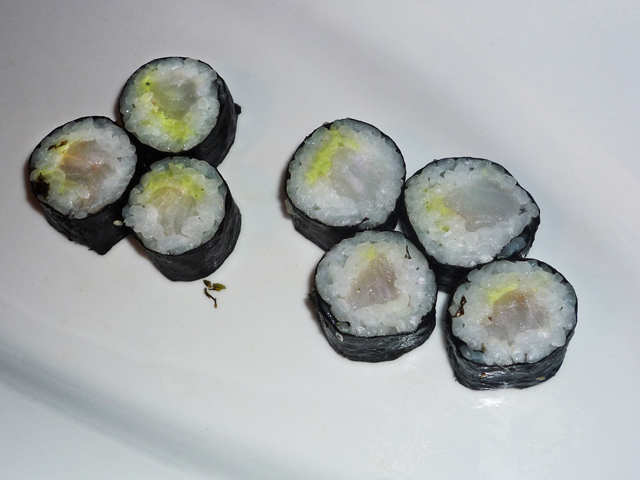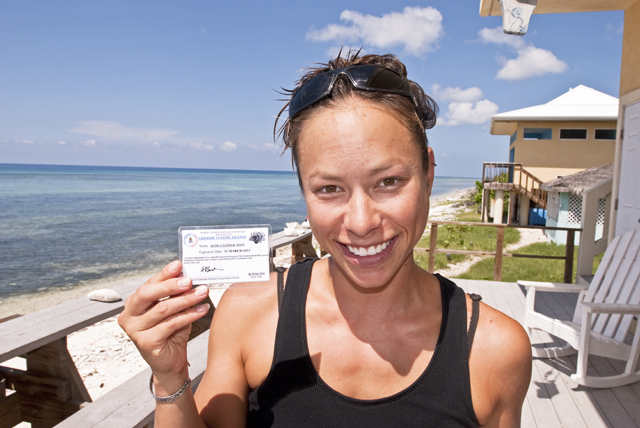Marine Life & Conservation
Licensed to Cull
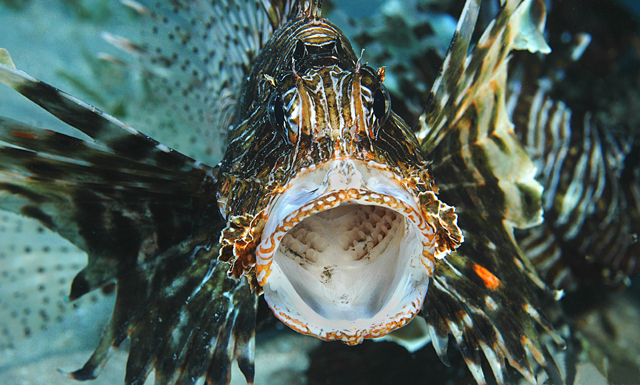
Over the past few years lionfish have been dominating the news headlines. In fact they are probably the most talked about marine species in the Caribbean. There are even ‘wanted’ posters on display in many dive centres. But these posters are not advertising underwater photography or promoting marine life; they are basically ‘kill on sight’ orders.
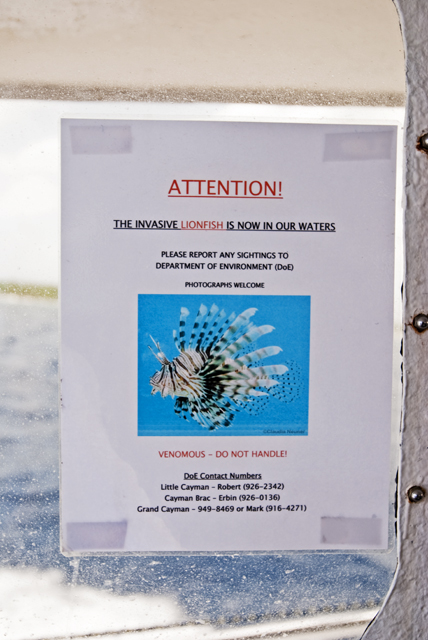 In the Red Sea lionfish (Pterois volitans) are extremely popular with divers. Their bold stripy colours and large venomous spines look great in photographs and they are fascinating to watch, especially when hunting in packs. But the Atlantic Ocean is not their home territory and what’s deemed as an attraction on one continent is seriously threatening the very existence of another.
In the Red Sea lionfish (Pterois volitans) are extremely popular with divers. Their bold stripy colours and large venomous spines look great in photographs and they are fascinating to watch, especially when hunting in packs. But the Atlantic Ocean is not their home territory and what’s deemed as an attraction on one continent is seriously threatening the very existence of another.
During a recent trip to the Cayman Islands I spoke with Flower Moye, a researcher for the CCMI (Central Caribbean Marine Institute) based on Little Cayman. She said that the most likely theory is the whole disaster had been caused by a freak accident. Flower said the Caribbean ‘strain’ had probably been released by aquariums somewhere near Miami. They are now sweeping from island to island heading due south. Some have even been reported as far away as Belize. Flower said “we are not sure where they are or where they are going”. She thinks the present crisis could have been caused by as little as 6 original lionfish. She also thought they were dealing with 2 separate species.
Flower said that the Caymans are now on a lionfish high alert. The ‘hardcore scramble’ started in 2007. Two researchers from Oregon State University were taken on to solely study lionfish characteristics. They are checking sizes, weights and DNA strings to see where they originated from. Studies have shown that the Caribbean lionfish are actually growing in size. They have already exceeded their normal length by a massive 15cm and are still getting bigger. This invasive species has no natural enemies so are just decimating one reef after another. Flower said “no one was prepared or expected such an aggressive full on attack”.
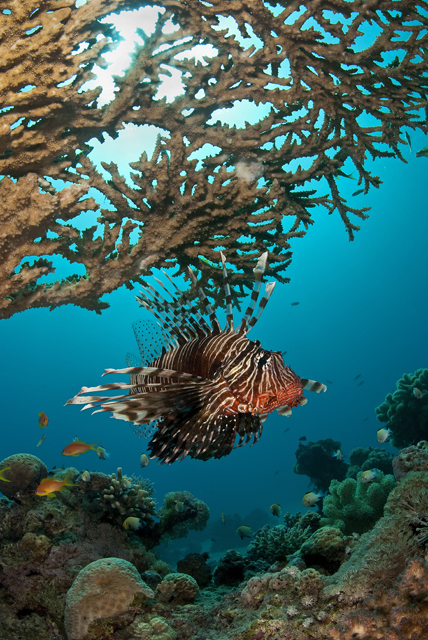
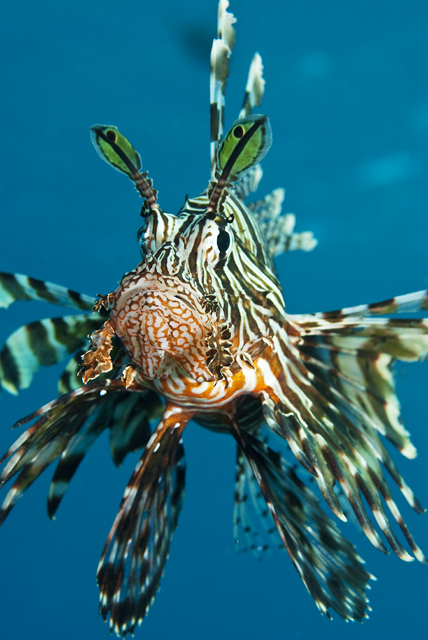 The alien invasion has now reached critical levels and is threatening the whole eco-system. Lionfish are just eating their way through entire cleaning stations. Flower said a dissected specimen had more than 32 fish in its stomach. The local fish population just don’t know how to react. The voracious predator is herding up the unsuspecting fish using their spines and then it’s a full on feeding frenzy. Divers recorded one individual eating 20 juveniles in 30 minutes. Their main targets are damsels and cardinals but every species is under threat. Flower said that the survival rate for reef inhabitants has reduced by a staggering 80 percent. This has a huge knock on effect. The loss of grazers like parrotfish means seaweeds and algae can thrive. This will eventually overwhelm the coral reefs.
The alien invasion has now reached critical levels and is threatening the whole eco-system. Lionfish are just eating their way through entire cleaning stations. Flower said a dissected specimen had more than 32 fish in its stomach. The local fish population just don’t know how to react. The voracious predator is herding up the unsuspecting fish using their spines and then it’s a full on feeding frenzy. Divers recorded one individual eating 20 juveniles in 30 minutes. Their main targets are damsels and cardinals but every species is under threat. Flower said that the survival rate for reef inhabitants has reduced by a staggering 80 percent. This has a huge knock on effect. The loss of grazers like parrotfish means seaweeds and algae can thrive. This will eventually overwhelm the coral reefs.
Grand Cayman Authorities have realised the seriousness of the problem and are responding rapidly. It’s basically a case of exterminate or be exterminated. They have given divers the authorisation to actively seek out and destroy as many lionfish as possible. But before being issued with a license to cull they have to first sit through an hour long Powerpoint presentation. This explains the reasons behind the drastic measures, how to catch them (without getting stung) and what to do with them afterwards. Flower said the most humane way of killing them is to put them in the freezer so that they ‘go to sleep’ and then bury them on land or eat them.
Some divers are even grilling lionfish steaks on the barbecue but obviously the poisonous spines have to be cut off with scissors before the fleshy parts can be sliced up into pieces. Gladys, the owner of Pirates Point on Little Cayman, had prepared some lionfish Sushi for me. I tried a few pieces and although it had a strange twangy taste, it wasn’t at all offensive or inedible. Adding some Wasabi was all it took to spice up the flavour and make it palatable. At Cobalt Coast resort they invited me to a lionfish cook out where I tried all sorts of dishes from deep fried goujons to an extremely tasty bouillabaisse. At least lionfish was proving good to eat!
Dive guides are even trying to ‘train’ the local Nassau grouper population to eat the lionfish. Laura, an Instructor working at the Little Cayman Beach resort, dropped a freshly caught lionfish in front of a grouper and after a few seconds of deliberation it decided to take a bite. But unless the lionfish are actually placed in front of them they don’t seem to be interested. It’s just not seen as a natural food source.
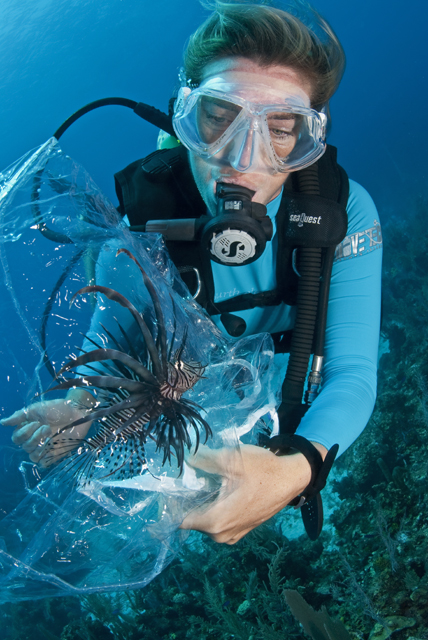 I went for a quick dive with Laura hunting for lionfish and within 10 minutes we managed to find one under a coral mount. Laura scooped the lionfish into a plastic bag and then put it into an ice box back on board the boat. All sightings are reported to the D.O.E. so they can get a good idea where they are and in what numbers. But lionfish are proving a tough species to eradicate. They adapt very quickly. At one dive site I searched below 40 metres and found a number of big 20 – 30cm lionfish lurking underneath ledges all along the wall. I’m sure they had cottoned on that recreational divers don’t usually go this deep so there was less likelihood of being caught.
I went for a quick dive with Laura hunting for lionfish and within 10 minutes we managed to find one under a coral mount. Laura scooped the lionfish into a plastic bag and then put it into an ice box back on board the boat. All sightings are reported to the D.O.E. so they can get a good idea where they are and in what numbers. But lionfish are proving a tough species to eradicate. They adapt very quickly. At one dive site I searched below 40 metres and found a number of big 20 – 30cm lionfish lurking underneath ledges all along the wall. I’m sure they had cottoned on that recreational divers don’t usually go this deep so there was less likelihood of being caught.
The licenses are proper looking ID cards complete with a head and shoulders photograph of the holder. The culling is being promoted as a form of ‘pest control’. But numbers are still growing at an incredible rate. Lionfish can release up to 30,000 eggs a month which equates to more than 2,000,000 eggs every year. Flower said that when they grow to a size of 10cm they are ready to spawn and from then on will keep spawning every 4 days for the rest of their lives! At present there seems to be very little information available on mating habits etc. The only way of finding out the sex of each individual fish is to dissect it. Flower estimates that numbers around Little Cayman are in the high hundreds but this is considered to be a very conservative estimation. In 2008 a researcher caught a total of 197 Lionfish in a small defined area.
At present there is no long term solution to the Lionfish catastrophe. These underwater terminators are not afraid of anything and literally can’t be stopped. In other parts of the world reef fish have learnt to avoid them and there are more natural predators like groupers or stonefish keeping population levels in check. Unfortunately Caribbean grouper numbers have fallen dramatically due to overfishing. This situation requires a more drastic approach but introducing another ‘alien’ species specifically to kill the lionfish is not seen as a good idea. Flower said “Having 2 invasives will not solve the problem and could in fact just make the situation a whole lot worse”. And so the war continues….
Marine Life & Conservation
Double Bubble for Basking Sharks

 The Shark Trust is excited to announce that, for two more days only, all donations, large or small, will be doubled in the Big Give Green Match Fund!
The Shark Trust is excited to announce that, for two more days only, all donations, large or small, will be doubled in the Big Give Green Match Fund!
Donate to Basking in Nature: Sighting Giants
The Shark Trust is hoping to raise £10k which will be doubled to £20k. This will go towards Basking in Nature: Sighting Giants. And they need YOUR help to reach they’re goal.
The Shark Trust’s citizen science project is to monitor and assess basking sharks through sightings; encouraging data collection, community engagement, and promoting nature accessibility. This initiative aims to enhance health and wellbeing by fostering a deeper connection with British Sharks.
Campaign Aims
- Increase citizen science reporting of Basking Sharks and other shark sightings to help inform shark and ray conservation.
- Provide educational talks about the diverse range of sharks and rays in British waters and accessible identification guides!
- Create engaging and fun information panels on how to ID the amazing sharks and rays we have on our doorstep! These can be used on coastal paths around the Southwest. With activities and information on how you can make a difference for sharks and rays!
- Promote mental wellbeing through increasing time in nature and discovering the wonders beneath the waves!
Donate, and double your impact. Click Here
Marine Life & Conservation
Leading UK-based shark conservation charity, the Shark Trust, is delighted to announce tour operator Diverse Travel as a Corporate Patron

 Corporate Patrons provide a valuable boost to the work of The Shark Trust. The Trust team works globally to safeguard the future of sharks, and their close cousins, the skates and rays, engaging with a global network of scientists, policymakers, conservation professionals, businesses and supporters to further shark conservation.
Corporate Patrons provide a valuable boost to the work of The Shark Trust. The Trust team works globally to safeguard the future of sharks, and their close cousins, the skates and rays, engaging with a global network of scientists, policymakers, conservation professionals, businesses and supporters to further shark conservation.
Specialist tour operator Diverse Travel has operated since 2014 and is committed to offering its guests high quality, sustainable scuba diving holidays worldwide. Working together with the Shark Trust will enable both organisations to widen engagement and encourage divers and snorkellers to actively get involved in shark conservation.
“Sharks are truly at the heart of every diver and at Diverse Travel, we absolutely share that passion. There is nothing like seeing a shark in the wild – it’s a moment that stays with you forever!” says Holly Bredin, Sales & Marketing Manager, Diverse Travel.
“We’re delighted to celebrate our 10th year of business by becoming a Corporate Patron of the Shark Trust. This is an exciting partnership for Diverse and our guests. We will be donating on behalf of every person who books a holiday with us to contribute towards their vital shark conservation initiatives around the world. We will also be working together with the Trust to inspire divers, snorkellers and other travellers to take an active role – at home and abroad – in citizen science projects and other activities.”
Paul Cox, CEO of The Shark Trust, said:
“It’s an exciting partnership and we’re thrilled to be working with Diverse Travel to enable more divers and travellers to get involved with sharks and shark conservation. Sharks face considerable conservation challenges but, through collaboration and collective action, we can secure a brighter future for sharks and their ocean home. This new partnership takes us one more valuable step towards that goal.”
For more information about the Shark Trust visit their website here.
For more about Diverse Travel click here.
-

 News3 months ago
News3 months agoHone your underwater photography skills with Alphamarine Photography at Red Sea Diving Safari in March
-

 News3 months ago
News3 months agoCapturing Critters in Lembeh Underwater Photography Workshop 2024: Event Roundup
-

 Marine Life & Conservation Blogs2 months ago
Marine Life & Conservation Blogs2 months agoCreature Feature: Swell Sharks
-

 Blogs2 months ago
Blogs2 months agoMurex Resorts: Passport to Paradise!
-

 Blogs2 months ago
Blogs2 months agoDiver Discovering Whale Skeletons Beneath Ice Judged World’s Best Underwater Photograph
-

 Gear Reviews2 months ago
Gear Reviews2 months agoGear Review: Oceanic+ Dive Housing for iPhone
-

 Marine Life & Conservation2 months ago
Marine Life & Conservation2 months agoSave the Manatee Club launches brand new webcams at Silver Springs State Park, Florida
-

 News3 months ago
News3 months agoWorld’s Best Underwater Photographers Unveil Breathtaking Images at World Shootout 2023


